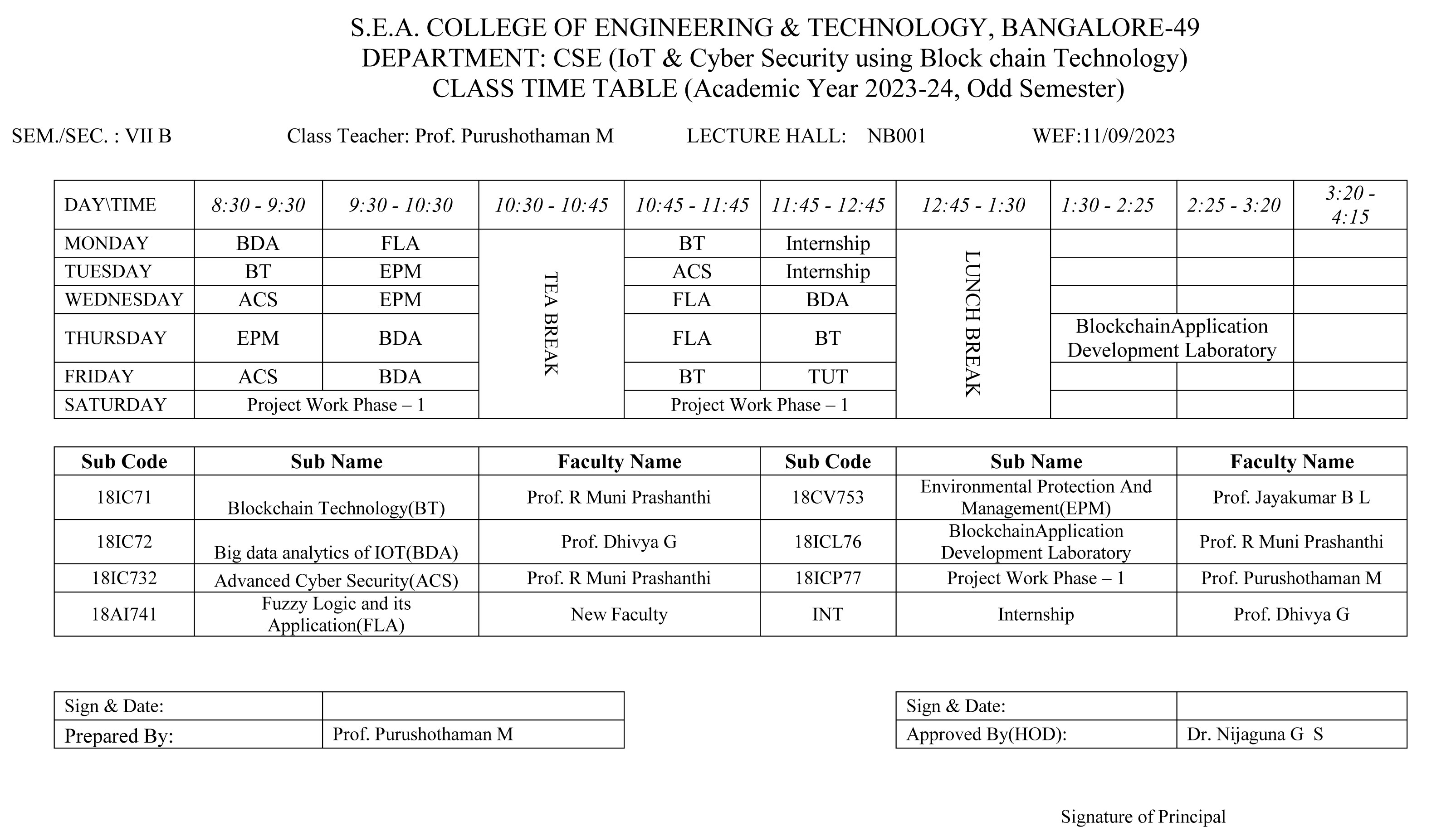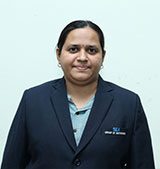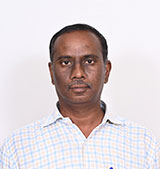1.Dr. Usha Desai for the successful publication of her book titled “Decision Support System for Diabetes Healthcare: Advancements and Applications” by River Publisher (Denmark) and indexing in Scopus.
2. Received SERB International Travel Grant for 39th Annual International Conference of the IEEE EMBC'17 at Jeju Island, South Korea.
3. Conducted FDP on Applications of Artificial Intelligence in Brain Computer
Interface, Sponsored by DST-SERB (Scientific Social Responsibility Policy).
4. Completed NPTEL courses on Biomedical Signal Processing, Machine
Learning, Emotional Intelligence, Soft Skills, etc.
5. Served as Session chair in IEEE reputed conferences in India and abroad.
6. Approved research supervisor under VTU, Belagavi, Karnataka.
7. Delivered invited technical talks in reputed academic institutions.
8. Participated in IEEE Summer School on Emerging Research Trends in
Computational Intelligence Techniques to Address Challenges in Biomedical
Data and Imaging, from Nov 7th to 11th 2022, conducted by NIT Arunachal
Pradesh.
9. Participated in FDP on “Recent Trends in Signal and Image Processing
Applications” 12th-21st June 2023, Organized by E & ICT Academy NIT Warangal.
10. Submitted DST-NSF Joint call research proposal in Aug. 2023.
Research Publications:
1. Journal Papers
[1] Usha Desai, R.J. Martis, C.G. Nayak, G. Seshikala, Sarika K., and Ranjan Shetty K.,
"Decision Support System for Arrhythmia Beats using ECG Signals with DCT, DWT and
EMD Methods: A Comparative Study," Journal of Mechanics in Medicine and Biology,
vol.16, no. 1, pp. 1640012 (1-19), Feb. 2016. (World Scientific Publishing Company, Impact
Factor 0.883)
[2] Usha Desai, R.J. Martis, U.R. Acharya, C.G. Nayak, G. Seshikala, and Ranjan Shetty
K., "Diagnosis of Multiclass Tachycardia Beats using Recurrence Quantification Analysis
and Ensemble Classifiers," Journal of Mechanics in Medicine and Biology, vol. 16, no. 1, pp.
1640005 (1-21), Feb. 2016. (World Scientific Publishing Company, Impact Factor 0.883)
[3] Usha Desai, C.G. Nayak, G. Seshikala, “Application of Ensemble Classifiers in Accurate
Diagnosis of Myocardial Ischemia Conditions,” Progress in Artificial Intelligence, vol. 6,
pp.245-253, 2017. (Springer, Impact Factor 0.913)
[4] VP Gurupur, SA Kulkarni, X Liu, Usha Desai, A. Nasir, “Analyzing the Power of Deep
Learning Techniques Over Traditional Methods Using Medicare Utilization and Provider
Data,” Journal of Experimental & Theoretical Artificial Intelligence, (Taylor & Francis,
Impact Factor 2.296).
[5] Janapati R, Dalal V, Sengupta R, Usha Desai, Raja Shekar PV, Kollem S. “Towards a
More Theory-Driven BCI Using Source Reconstructed Dynamics of EEG Time-Series” Nano
LIFE. 2022 Jun 9;12(02):2250005.
[6] Ankit Vijayvargiya, Bharat Singh, Rajesh Kumar, Usha Desai, Jude Hemanth, "Hybrid
Deep Learning Approaches for sEMG Signal-Based Lower Limb Activity Recognition",
Mathematical Problems in Engineering, vol. 2022, Article ID 3321810, 12 pages, 2022.
https://doi.org/10.1155/2022/3321810 IF 1.43
[7] Bhattacharya, S., Hussain, M. I., Ajayan, J., Tayal, S., Joseph, L. M. I. L., Kollem, S.,
Usha Desai, Ahmed, S. M., and Janapati, R., “Analysis of read speed latency in 6T-SRAM
cell using multi-layered graphene nanoribbon and Cu based nano-interconnects for high
performance memory circuit design” ETRI Journal, 1– 12, 2022.
https://doi.org/10.4218/etrij.2022-0068 IF 1.622.
[8] Janapati R, Dalal V, Usha Desai, Sengupta R, Kulkarni SA, Hemanth DJ. Classification
of Visually Evoked Potential EEG Using Hybrid Anchoring-based Particle Swarm Optimized
Scaled Conjugate Gradient Multi-Layer Perceptron Classifier. INTERNATIONAL
JOURNAL ON ARTIFICIAL INTELLIGENCE TOOLS. 2023 May 22;32(03):2340016.
https://doi.org/10.1142/S021821302340016X IF 1.059
[9] J. E. Martis, S. M. Shetty, M. R. Pradhan, Usha Desai and B. Acharya, "Text-to-sketch
synthesis via adversarial network," Computers, Materials & Continua, vol. 76, no.1, pp. 915–
938, 2023. https://doi.org/10.32604/cmc.2023.038847 IF 3.86.
2. Conference Papers
[1] Usha Desai, C.G. Nayak, G. Seshikala, and R.J. Martis, “Automated Diagnosis of
Coronary Artery Disease using Pattern Recognition Approach,” 39th Annual International
Conference of the IEEE EMBS, Jeju Island, South Korea, July 11-15, 2017.
(Indexed for MEDLINE PMID: 29059903)
• Received travel grant to attend this International Conference from Department of
Science and Technology (DST), Government of India (GOI) under the Science and
Engineering Research Board (SERB) for International Travel Support (ITS) Scheme.
[2] Usha Desai, R.J. Martis, C.G. Nayak, G. Seshikala, and Sarika K., “Machine intelligent
diagnosis of ECG for arrhythmia classification using DWT, ICA and SVM,” Annual IEEE
India Conference (INDICON), JMI, New Delhi, Dec. 17 2015.
[3] Usha Desai, C.G. Nayak, and G. Seshikala, “An Application of EMD in Detection of
Tachycardia Beats,” IEEE International Conference on Communication and Signal
Processing, Adhiparasakthi College of Engineering, Tamil Nadu, April 6 2016.
[4] Usha Desai, C.G. Nayak, and G. Seshikala, “Diagnosis of Cardiac Rhythms Using
Support Vector Machine Classifier,” IEEE International Conference on Recent Trends in
Electronics, Information & Communication Technology, Sri Venkateshwara College of
Engineering, Bengaluru, May 20 2016.
[5] Usha Desai, C.G. Nayak, and G. Seshikala, “Automated Diagnosis of Arrhythmia Beats
Using ECG with DWT, PCA and SVM Techniques,” International Conference on
Biomedical Systems Signals and Images, IIT Madras, Chennai, Feb. 25 2016.
[6] Usha Desai, C.G. Nayak, G. Seshikala, R.J. Martis and S.L. Fernandez, “Automated
Diagnosis of Tachycardia Beats,” International Conference on Smart Computing and
Informatics, Andra Pradesh, Mar. 3 2017.
[7] G. Naveena Pai and Usha Desai, "Cardiac Monitoring & Resuscitation System for
Ventricular Fibrillation Detection," 2018 International Conference on Circuits and Systems
in Digital Enterprise Technology (ICCSDET), 2018, pp. 1-3, doi:
10.1109/ICCSDET.2018.8821201.
[8] Usha Desai and A D Shetty, "Electrodermal Activity (EDA) for Treatment of
Neurological and Psychiatric Disorder Patients: A Review," 2021 7th International
Conference on Advanced Computing and Communication Systems (ICACCS), 2021, pp.
1424-1430, doi: 10.1109/ICACCS51430.2021.9441808.
[9] Rajasree PM, Anand Jatti, Divya Santosh, Usha Desai, and Veena Divya Krishnappa,
“Breast Masses Detection and Segmentation in Full-Field Digital Mammograms using
Unified Convolution Neural Network,” 44th Annual International Conference of the IEEE
EMBS, Scottish Event Campus, Glasgow, UK, July 11-15, 2022. (Indexed for MEDLINE
PMID: 36085669).
[10] K. Amulya, K. Soniya, S. Rabbani, V. K. Varma, J. Ajayan and Usha Desai,
"Performance Optimization of LG = 16 nm Pulse Triggered Low Power High Speed Data
Flip-Flops at Higher Temperatures with a VDD of 0.7V," 2022 IEEE International Conference
on Nanoelectronics, Nanophotonics, Nanomaterials, Nanobioscience & Nanotechnology
(5NANO), 2022, pp. 1-5, doi: 10.1109/5NANO53044.2022.9828948.
[11] Usha Desai, R. J. Martis, R. Janapati and K. N. V. P. S. Rajesh, "Coronary Artery
Disease (CAD) Heart Beats Classification Using Recurrence Plots," 2023 3rd International
conference on Artificial Intelligence and Signal Processing (AISP), VIJAYAWADA, India,
2023, pp. 1-5, doi: 10.1109/AISP57993.2023.10134939.
[12] S. N. Panda, S. Verma, M. Sharma, Usha Desai and A. Panda, "Smart and Portable IoT
Drug Dispensing System for Elderly and Disabled Person," 2022 IEEE 7th International
Conference on Recent Advances and Innovations in Engineering (ICRAIE), MANGALORE,
India, 2022, pp. 144-147, doi: 10.1109/ICRAIE56454.2022.10054251.
[13] Usha Desai, A. D. Shetty, T. M, A. S. A, G. Nekar and S. B, "Detection of Anxiety in
Psychiatric Patients using Physiological Signals," 2022 IEEE 19th India Council
International Conference (INDICON), Kochi, India, 2022, pp. 1-5, doi:
10.1109/INDICON56171.2022.10040142.
[14] S. N. Panda, M. Janagal, S. Verma and Usha Desai, "An Integrated Medical Convertible
Wheelchair with IoT Based Surveillance System for Patient Monitoring: Design and
Development," 2022 IEEE 19th India Council International Conference (INDICON), Kochi,
India, 2022, pp. 1-6, doi: 10.1109/INDICON56171.2022.10039754.
[15] S. Kollem, L. Joseph, Usha Desai, et al., "INCNet: Brain Tumor Detection using
Inception and Optimization Techniques," 2022 International Conference on Emerging
Techniques in Computational Intelligence (ICETCI), Hyderabad, India, 2022, pp. 71-75, doi:
10.1109/ICETCI55171.2022.9921369.
[16] R. P. Kumar, S. S. Vandana, D. Tejaswi, K. Charan, R. Janapati and Usha Desai,
"Classification of SSVEP Signals using Neural Networks for BCI Applications," 2022
International Conference on Intelligent Controller and Computing for Smart Power
(ICICCSP), Hyderabad, India, 2022, pp. 1-6, doi: 10.1109/ICICCSP53532.2022.9862368.
[17] Swasthik and Usha Desai, "Automated detection of cardiac health condition using linear
techniques," 2017 2nd IEEE International Conference on Recent Trends in Electronics,
Information & Communication Technology (RTEICT), Bangalore, India, 2017, pp. 890-894,
doi: 10.1109/RTEICT.2017.8256726.
3. Patents Published
1. Application No. 202211020566 “Device for Diabetic Retinopathy and Hypertensive
Retinopathy and Method” patent published in Dec. 2022.
2. App. No. 202241050482 A “System and Method for analyzing Stress of a Psychiatric
User” published on 16/9/2022.
3. Appl. No: 202241023366 A “Visual aid-based drowsiness detection and warning
initiation system and method thereof” published on 6th May 2022.
4. Appl No. 202211045768 “Assembly for Lifting Patient from Hospital Bed” Utility
patent published on Jan 2023.
5. Appl. No: 202341007301 A “System and method for monitoring health conditions of
an Industrial worker” published on Feb 2023.
4. Books Published
[1] Human-Machine Interface Technology Advancements and Applications Edited By Ravichander
Janapati, Usha Desai, Shrirang Ambaji Kulkarni, Shubham Tayal, CRC Press, Sept. 2023 ISBN
9781032351520.
[2] Medical Health Paradigms for Enabling the Digital Health, CRC Press, 2023, (under process).
[3] Decision Support System for Diabetic Healthcare: Advancements & Applications, River
Publisher, 2023, (under process).
[4] Data Science in Pharmaceutical Development, Wiley-Scrivener Publishing, Oct. 2023, (under process).
5. Book Chapters
1. Discrete Cosine Transform Features in Automated Classification of Cardiac Arrhythmia Beats Usha Desai, R.J. Martis, C.G. Nayak, K. Sarika, S.G. Nayak, A. Shirva,V. Nayak, Shaik Mudassir, Emerging research in computing, information, communication and applications
Springer, New Delhi, 2015.
2. Automated diagnosis of tachycardia beats
Usha Desai, C.G. Nayak, G Seshikala, R.J. Martis, Steven L Fernandes, Smart Computing and Informatics Springer, Singapore, 2018.
3. Computer-Aided Detection for Early Detection of Lung Cancer using CT Images
Usha Desai, Sowmya Kamath, Akshaya D Shetty, M Sandeep Prabhu, Intelligent Sustainable Systems Springer, India, 2022.
4. An Overview of Recent Approaches in Brain-Computer Interface Systems using Electroencephalograpy Shishir Maheswari, Kandala N V P S Rajesh, Usha Desai, and
T. Sunil Kumar, Human–Machine Interface Technology Advancements and Applications, CRC, 2023.
5. Nano technology advancements in HMI Vivek P Chavda, Mital Patel, Patel Ritu J, Thakkar Kunjal H, Patel Disha B, Pankti Balar, Piyush Patel, Usha Desai. Human–Machine Interface Technology Advancements and Applications, CRC, 2023.
6. Image Denoising: An Overview of Important Methods in Spatial and Transform Domain Aravind B N, K V Suresh, Nataraj Urs H D, Yashwanth N, and Usha Desai, Human–Machine Interface Technology Advancements and Applications, CRC, 2023.
7. Prediction on Illegal Drug Consumption Promotion from Twitter Data. Shetty, S.S., Singh, C., Rao, S.B., Usha Desai, Srinivas, P.M. Emergent Converging Technologies and Biomedical Systems, 2022. Lecture Notes in Electrical Engineering, vol 1040. Springer, Singapore, 2023.










